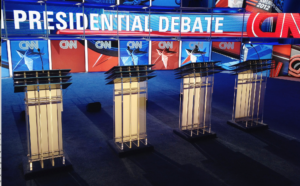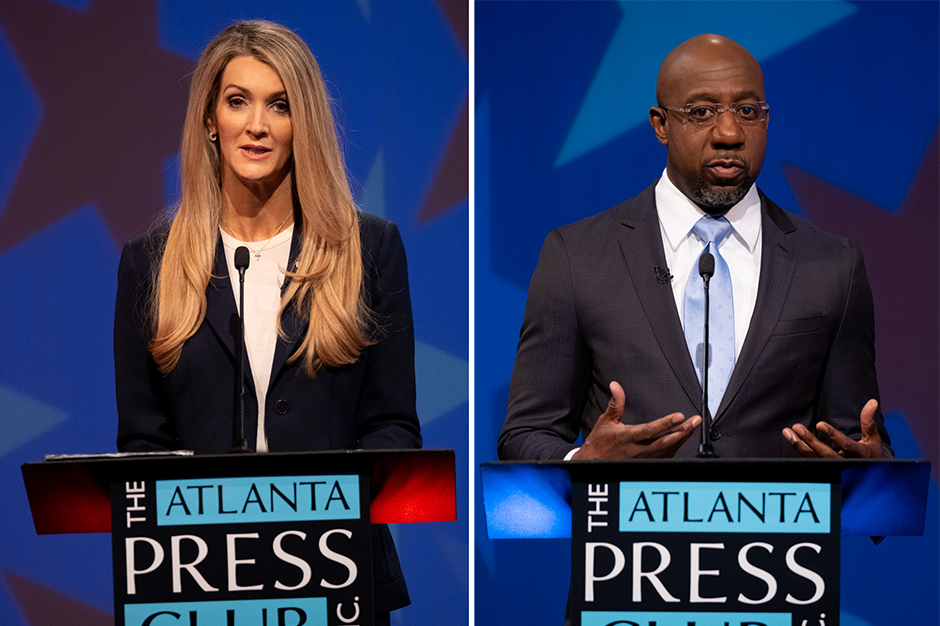If you’ve ever tuned in to watch a political debate, or read a passionate think-piece that covered one, you’ve definitely experienced some sort of FOMO (fear of missing out). Whether you avoided the news over the years or just became aware of their existence, many people have trouble changing the channel. There’s no doubt that political debates are a highly-anticipated spectacle during election season, but why? For starters, voters look forward to dialogue amongst candidates in hopes that they’ll reveal their plans for effective government oversight and policy reform. The dialectic that occurs during debates is ultimately performative in nature- a contest that provides insight to candidates’ range of thought.
Given that we’ve collectively accepted debates as innately persuasive, is it reasonable to base our votes on the resources of cunning and political aptitude aired on television? Instead of changing the channel, examining prior candidates and the behavior of candidates pre-broadcast and post-election yields deeper questions that are necessary to expand our political consciousness. Viewing debates as an exhibition is a constructive way to understand our world’s problems in a society that is suspicious of everything. We typically tend to stray away from “As seen on TV” merchandise, inadvertently, due to disingenuous marketing, yet we receive debate propaganda as a trivial occurrence. If our votes speak to our taste and discernment, we can legitimately view debates as a presentation of the candidate’s tact.

We invest in press conferences with the understanding of the candidates’ goal to win our trust to secure the vote. Moreso, it’s not uncommon for candidates to boast polls and approval ratings, as politicians have come to understand viewership as tacit awareness of their antics. According to an article published by CNN, Donald Trump’s approval stayed the same after the final debate with approx. 42% approval pre and post-debate. In October of 2020, this specific approval poll revealed that viewers were split over Trump’s criticisms of now President Joe Biden and not so moved by Biden’s criticism of Trump: the debate didn’t sway viewers’ impressions of either candidate. Thus, debates are fundamentally demonstrations of common themes in American politics: self-serving oversight and extreme conviction.
Debates have inherent value in viewers who are seeking an opportunity to validate their existing personal beliefs. But what about those on the fence, or those looking to deviate from the norms established in the last presidency? Since we’ve learned that debates rarely convince viewers to deviate from their party affiliation, it’s worth exploring ways to upgrade the annual show. Feedback from seasoned writers and creative thinkers suggest that a collective rethinking of the structure, moderators and focus of debates would help reshape the culture of debates as featured in Politico Magazine. Narrowing the focus and diversifying the format of debates could be a great way to examine the character of the candidate-and more importantly- their intent. It’s common for candidates to deviate from the question topic and provide an anecdote that speaks to what they were briefed to discuss. In an attempt to create a more genuine experience for viewers, alternating the types of moderators to include journalists, educators and other industry experts poses an instinctive way to refresh the experience. The variety of perspectives discussed as a result helps to prevent candidates from reframing the questions posed-forcing them to respond to subject matter that they may not have considered in detail.

Our society is founded on multi-faceted individuals and politicians are no exception. Including this representation on the opposite side of the stage is a guiding step to improving debates. Further, the medium itself (news outlets) is naturally performative: the success of the debate is measured by viewers’ outrage or applause. Designing a medium that feels more personalized and constructive is possible if we stray away from outlets that already have party affiliations. As we consider alternatives to our debate format, it is essential to seek solutions from researchers, teachers and community leaders whose scholarship can improve the intellectual restructuring of our election process.
Ralph Cintron, Ph.D, an Associate Professor of English; Latin American and Latino Studies at the University of Illinois Chicago and 2020 recipient of the Rhetoric Society of America Fellows Award, has a prolific grasp of rhetorical studies, namely the necessity of conversation that prompts reflection and deliberation, as published in his books Democracy As Fetish and “Angels’ Town: Chew Ways, Gang Life, and Rhetorics of the Everyday”. Dr. Cintron’s fieldwork covers ethnographic research and rhetorical studies, while his numerous academic journals and feature articles offer a critical analysis of modern democracy through the lens of urban studies, economic theory and political economy.
Keeping these facets of our governance in mind as we mull over the past election season, Dr. Cintron has put forward a new method of evaluating candidates’ political efficacy worth examining; “Grilling Week” in which candidates would be stripped of their public personas and, ideally, be void of all tactical shields to expose the motivations behind their desire to take office This process of “grilling” should be spearheaded by a panel of randomly-selected individuals who dedicated a year (at minimum) of study to dissecting all relevant issues of concern. Thus, in order for politicians to effectively “ascend the dialectical ladder” -minus the theatrics-they must oblige to thorough “grilling” if they are to be considered eligible candidates. If all goes well, the challenge of unraveling each candidates’ ideals via lottery-chosen panelists hinders the circulation of hidden motivation or external biases.
As a result, candidates will struggle to contest one another as this grilling method obstructs debates as entertainment. Ultimately, refining our debates to take a more shrewd approach will allow voters to uncover which political figure most closely aligns with the idealized version of democracy they’d like to support. De-glamorizing the performance of debates and replacing them with “Grilling Week” presents a remedy to the cryptic tactics flaunted in recent debates.
As the cycle goes, debates highlight the health of our democracy. The cajolery continues and the media’s attempts to remain inconspicuous during election season inspires more suspicion in modern voters used to the arm-twisting. Presidential elections in the United States present a series of debates, accessible to anyone regardless of race, party affiliation or personal convictions. During our formative years, our school systems taught us that debates are an opportunity for candidates to boast their leadership faculty while demonstrating their understanding of the American experience. The debate phenomenon is not unique as our educational system tends to only scratch the surface with similar political topics of interest.
Although debates reflect the American grandeur and oversight ingrained in our media systems, there are no rules that force us to follow suit in the future. Fortunately, the future is now and our current social climate invites tangible restructuring of almost everything. A collective effort to muster up an authentic reform strategy from a variety of charismatic individuals will allow America to debut a new style of debates worth watching.


